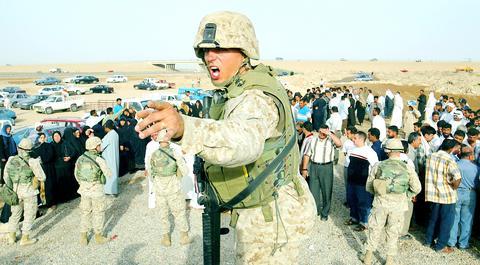US Defense Secretary Donald Rumsfeld made a surprise visit to Baghdad yesterday, flying into the eye of the storm over Americans torturing prisoners that has sapped Washington's credibility in Iraq.
Hours after US lawmakers viewed "sadistic" new photographs of US troops torturing Iraqis, the embattled secretary met Lieutenant General Ricardo Sanchez, the US commander in Iraq, and Major General Geoffrey Miller, the new head of US prisons there.
It was not clear whether he would visit the nearby Abu Ghraib jail itself, where seven military police reservists are charged with sexually and physically tormenting detainees.

PHOTO: AP
His trip looked like a robust answer to critics who say Rumsfeld, one of the architects of the Iraq war, should resign, six months before US President George W Bush seeks re-election.
As international anger at US conduct in Iraq -- and at its Guantanamo Bay prison on Cuba -- mounts, General Richard Myers, the chairman of the joint chiefs of staff who visited with Rumsfeld, said: "We absolutely have the high moral ground."
Once notorious as Saddam Hussein's torture chamber, Abu Ghraib has become a symbol of the US failure to win over many Iraqis despite ridding them of Saddam a year ago. With just seven weeks to go until Washington hands sovereignty back to an Iraqi government, that is a serious problem for Rumsfeld.
Efforts by the Bush administration to contain the damage to the seven soldiers charged have been buffeted by reports from the Red Cross and other groups saying that Washington was warned about systematic and widespread torture many months ago.
Not only are Arabs dismayed at evidence that the troops who overthrew Saddam's dictatorship were inflicting torments themselves on thousands of Iraqis but US allies, many of whom opposed the war, are also becoming more vocal in criticism.
"It all gives the impression of a total lack of direction," French Foreign Minister Michel Barnier told Le Monde newspaper in unusually tough comments about Iraq under US occupation.
Prisoner abuses and persistent violence showed the country and region were spinning out of control, Barnier said.
In the holy cities of Najaf and Kerbala, where US troops are facing an uprising by a Shiite Muslim militia loyal to radical cleric Moqtada al-Sadr, there was renewed fighting.
Al-Sadr's Mahdi Army fighters stormed the main police station in Najaf overnight and emptied the weapons store, police said, before they were driven off by US tanks.

Right-wing political scientist Laura Fernandez on Sunday won Costa Rica’s presidential election by a landslide, after promising to crack down on rising violence linked to the cocaine trade. Fernandez’s nearest rival, economist Alvaro Ramos, conceded defeat as results showed the ruling party far exceeding the threshold of 40 percent needed to avoid a runoff. With 94 percent of polling stations counted, the political heir of outgoing Costa Rican President Rodrigo Chaves had captured 48.3 percent of the vote compared with Ramos’ 33.4 percent, the Supreme Electoral Tribunal said. As soon as the first results were announced, members of Fernandez’s Sovereign People’s Party

MORE RESPONSIBILITY: Draftees would be expected to fight alongside professional soldiers, likely requiring the transformation of some training brigades into combat units The armed forces are to start incorporating new conscripts into combined arms brigades this year to enhance combat readiness, the Executive Yuan’s latest policy report said. The new policy would affect Taiwanese men entering the military for their compulsory service, which was extended to one year under reforms by then-president Tsai Ing-wen (蔡英文) in 2022. The conscripts would be trained to operate machine guns, uncrewed aerial vehicles, anti-tank guided missile launchers and Stinger air defense systems, the report said, adding that the basic training would be lengthened to eight weeks. After basic training, conscripts would be sorted into infantry battalions that would take

GROWING AMBITIONS: The scale and tempo of the operations show that the Strait has become the core theater for China to expand its security interests, the report said Chinese military aircraft incursions around Taiwan have surged nearly 15-fold over the past five years, according to a report released yesterday by the Democratic Progressive Party’s (DPP) Department of China Affairs. Sorties in the Taiwan Strait were previously irregular, totaling 380 in 2020, but have since evolved into routine operations, the report showed. “This demonstrates that the Taiwan Strait has become both the starting point and testing ground for Beijing’s expansionist ambitions,” it said. Driven by military expansionism, China is systematically pursuing actions aimed at altering the regional “status quo,” the department said, adding that Taiwan represents the most critical link in China’s

‘REALLY PROUD’: Nvidia would not be possible without Taiwan, Huang said, adding that TSMC would be increasing its capacity by 100 percent Nvidia Corp CEO Jensen Huang (黃仁勳) on Saturday praised and lightly cajoled his major Taiwanese suppliers to produce more to help power strong demand for artificial intelligence (AI), capping a visit to the country of his birth, where he has been mobbed by adoring fans at every step. Speaking at an impromptu press conference in the rain outside a Taipei restaurant, where he had hosted suppliers for a “trillion-dollar dinner,” named after the market capitalization of those firms attending, Huang said this would be another good year for business. “TSMC needs to work very hard this year because I need a lot